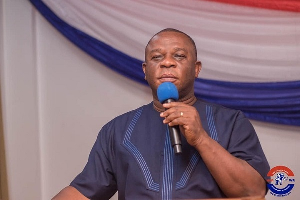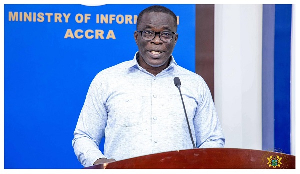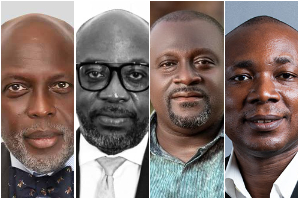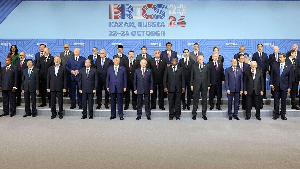While developed countries have been the emitter of Greenhouse Gases (GHGs) during the 19th and 20th century, this position has been taken over by the developing countries in the early 21st century. This challenge is beginning to impact their respective roles and responsibilities for climate governance. Climate change is one of the creeping and wicked problems that affect the lives of the vulnerable. Some present and projected future impacts such as those on food security, sea level rise are occurring with more intensity than previously anticipated. These impacts will be disrupted for all countries especially for the global poor and vulnerable peoples.
Unabated emissions pose an unacceptable risk of pushing our climate system towards potentially irreversible changes with highly damaging impacts to all sectors of society. Human activities such as charcoal burning, bush burning, sand wining, gravel mining, disposal of waste and illegal mining and these activities are at its alarming rate and as a result the is high release of carbon dioxide and methane which pose a threat to the ozone layer which affect the ecosystem, farming activities or agriculture, human health, forest and game reserves, water sources among others due to the negative role these gases play. The IPCC report released on 27 September stated that warming of the climate system is unequivocal, and since the 1950s, many of the observed changes are unprecedented over decades to millennia. The report is also clear that it is extremely likely that human influence has been the dominant cause of the observed warming since the mid-20th century. If we humans are the dominant cause of this observed warming, then definitely we have the solution and that solution is zero emission.
Ready For Emission Reduction?
The preeminent global experts on climate science shows clearly that current global emission must be drastically cut in order to limit temperature change to below 20C increase from pre-industrial levels.
Countries responsible for almost three-quarters of the world’s greenhouse gas pollution have submitted pledges to reduce emissions indicating progress toward a historic climate deal the United Nations is seeking by December. The delegates discussed the sort of long-term goals to set out in the Paris deal and considered the option of calling for a phase out of fossil-fuel pollution as early as the middle of the century.
For the goal of agreeing on a new framework of international efforts to fight global warming at the COP21 conference in Paris at the end of this year, participants in the negotiations have been urged to file their plans if they are ready. The 33 nations- the United States, European Union member states, Russia, Norway, Switzerland and Mexico- accounts for about 40% of greenhouse gas emissions worldwide. Japan, the world’s fifth largest emitter is not ready yet and the nation’s target for reducing its emission has been slowed. The government of Japan said he is not able to make commitments on cuts to emissions until it has a clear picture of nuclear power. The government of Japan must aim for ambitious plans to cut emissions that compare favorably with the targets set by other advanced economies.
Also, recent intentions of the Government of Ghana to establish a 700 MW Coal-fired Power Plant which certainly will emit volumes of Greenhouse Gases (GHG) emissions leading to severe health and environmental consequences. Media report says that about 20 million tonnes of coal is expected to be imported from South Africa for this project which will release about 2 million tonnes of gases into the atmosphere.
Ghana needs to provide a fair and ambitious INDC aiming for much drastic cuts from the combustion of fossil fuels in the second half of this century as Samoa, Ethiopia and the Maldives -have shown strong support for rapid emissions cuts needed to get to zero greenhouse gas emissions by 2050.
Potential Path To Zero Emission
Warming from carbon dioxide persists for many centuries; any upper limit on warming requires carbon dioxide emissions to fall eventually to zero. A two in three probability of holding warming to 2 degrees or less will require a budget that limits future carbon dioxide emissions to about 900 billion tons, roughly 20 times annual emissions in 2014. To limit warming to 2 degrees, emissions must be zero or even negative by the end of the 21st century.
According to the Chairman of the Scientific Paris meeting and Director of the US Carnegie Institution’s Department of Global Ecology Chris Field said “we are moving to a post-carbon era where climate change mitigation and adaptation are combined with goals to build a sustainable future”.
Zero emission is the best guarantee for all countries for ensuring that the poor and vulnerable are spared from ever more threatening impacts such as heat waves, poverty, food insecurity, crop failures, floods and water shortages that will increasingly threaten their lives and livelihoods.
Renewable resources are sustainable and so will never run out as compared to fossil fuels and the facilities for renewable resources generally require less maintenance than traditional generators. Their fuel being derived from natural and available resources would reduce the cost of operation as it will reduce countries dependence on fuels and energy from foreign governments and a promising energy source for future generations and significantly reduce global warming emissions. All countries need to aim for zero emission as a way of achieving the above prolific advantages of renewable resources.
I therefore make a strong call to all countries of the world to make much more drastic cut for an ambitious long term goal towards zero emission on a pathway to achieve zero net emissions from the combustion of fossil fuels in the second half of this century in order to help keep global temperature below 2 degrees. The Paris 2015 needs to send an unequivocal signal that the world will take a path towards a steep and deep decline in greenhouse gas pollution by the second half of the century.
BY
Fariya Abubakari is the Country Coordinator of End Ecocide Ghana,
Global Ambassador of YEW, Commonwealth Correspondence, Climate Tracker for Adopt a Negotiator Program. fariyaabubakari@yahoo.com,
Opinions of Monday, 21 September 2015
Columnist: Abubakari, Fariya


















